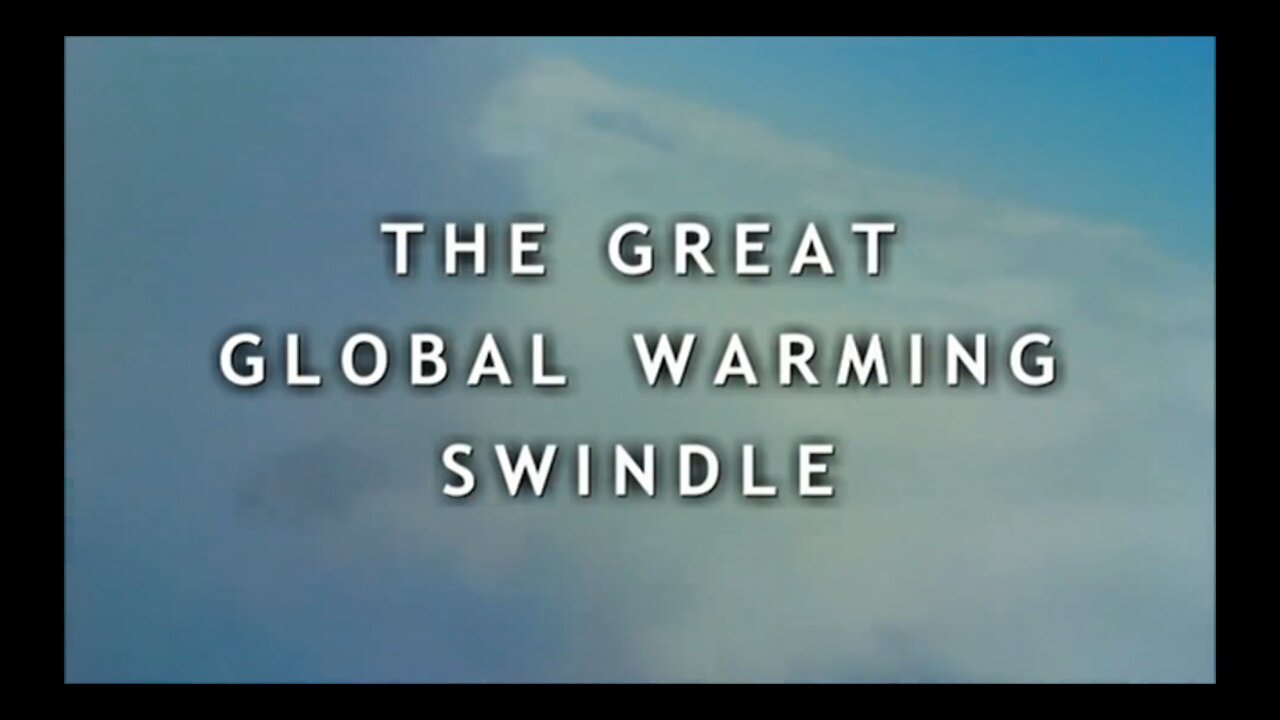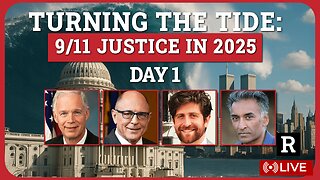Premium Only Content

The Great Global Warming Swindle - Full Documentary HD
The Great Global Warming Swindle is a controversial documentary film that argues against the scientific consensus that human activity is the main cause of global warming. The film, made by British television producer Martin Durkin, showcases scientists, economists, politicians, writers, and others who are sceptical of the scientific consensus on anthropogenic global warming. The programme's publicity materials assert that man-made global warming is "a lie" and "the biggest scam of modern times."
The UK's Channel 4 premiered the documentary on March 8 2007. The channel described the film as "a polemic that drew together the well-documented views of a number of respected scientists to reach the same conclusions. This is a controversial film but we feel that it is important that all sides of the debate are aired."
Although the documentary was welcomed by global warming skeptics, it was criticized heavily by many scientific organizations and individual scientists (including two of the film's contributors. The film's critics argued that it had misused data, relied on out-of-date research, employed misleading arguments, and misrepresented the position of the Intergovernmental Panel on Climate Change
Viewpoints expressed in the film
The film's basic premise is that the current scientific consensus on the anthropogenic causes of global warming has numerous scientific flaws, and that vested monetary interests in the scientific establishment and the media discourage the public and the scientific community from acknowledging or even debating this. The film asserts that the publicized scientific consensus is the product of a "global warming activist industry" driven by a desire for research funding. Other culprits, according to the film, are Western environmentalists promoting expensive solar and wind power over cheap fossil fuels in Africa, resulting in African countries being held back from industrializing.
A number of academics, environmentalists, think-tank consultants and writers are interviewed in the film in support of its various assertions. They include the Canadian environmentalist Patrick Moore, founding member of Greenpeace but for the past 21 years a critic of the organization; Richard Lindzen, professor of meteorology at the Massachusetts Institute of Technology; Patrick Michaels, Research Professor of Environmental Sciences at the University of Virginia; Nigel Calder, editor of New Scientist from 1962 to 1966; John Christy, professor and director of the Earth System Science Center at University of Alabama; Paul Reiter of the Pasteur Institute; the former British Chancellor of the Exchequer, Nigel Lawson; and Piers Corbyn, a British weather forecaster.
Carl Wunsch, professor of oceanography at the Massachusetts Institute of Technology, was also interviewed but has since said that he strongly disagrees with the film's conclusions and the way his interview material was used.
Assertions made in the film
The film takes a strongly skeptical view of current scientific thinking on climate change. It argues that the consensus on climate change is the product of "a multibillion-dollar worldwide industry: created by fanatically anti-industrial environmentalists; supported by scientists peddling scare stories to chase funding; and propped up by complicit politicians and the media".
Using a series of interviews and graphics, the film sets out to challenge the scientific consensus by focusing on issues such as perceived inconsistencies in the evidence and the role said to have been played by ideology and politics.
-
 2:08:03
2:08:03
Inverted World Live
6 hours agoCharlie Kirk Assassinated | Ep. 106
82.8K40 -
 3:01:07
3:01:07
TimcastIRL
7 hours agoCharlie Kirk Assassinated, Suspect In Custody | Timcast IRL
595K831 -
 5:44:49
5:44:49
Redacted News
10 hours agoTurning the Tide: 9/11 Justice in 2025 — Day 1 with Sen. Ron Johnson, Richard Gage and More
165K74 -
 2:48:00
2:48:00
TheSaltyCracker
7 hours agoYou're Being Hunted ReeEEStream 9-10-25
271K557 -
 13:09:56
13:09:56
LFA TV
21 hours agoBREAKING: CHARLIE KIRK ASSASSINATED - WEDNESDAY 9/10/25
364K123 -
 1:31:08
1:31:08
I_Came_With_Fire_Podcast
7 hours agoCheck Fire: God Bless Charlie Kirk
78.6K22 -
 1:13:35
1:13:35
Glenn Greenwald
9 hours agoCharlie Kirk Assassinated; NATO Alleges Russian Drones Flew Over Poland, and More | SYSTEM UPDATE #512
276K284 -
 1:46:28
1:46:28
Badlands Media
23 hours agoAltered State S3 Ep. 45: The Assassination of Charlie Kirk
151K25 -
 8:56:53
8:56:53
Dr Disrespect
15 hours ago🔴LIVE - DR DISRESPECT - THE FINALS - NEW SEASON 8 LAUNCH EVENT W/ THE SHOTTY BOYS
275K10 -
 LIVE
LIVE
RealAmericasVoice
3 days agoHOME OF REAL NEWS
3,018 watching